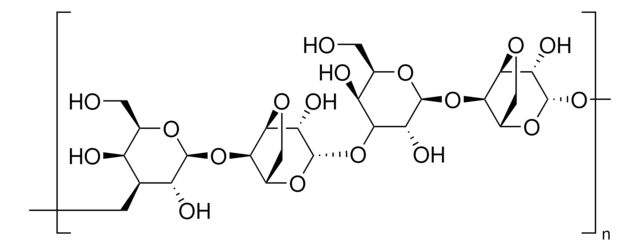A2929
Agarose
For pulsed field electrophoresis running gel
Synonym(s):
3,6-Anhydro-α-L-galacto-β-D-galactan
About This Item
Recommended Products
biological source
algae (red)
Quality Level
form
powder
technique(s)
electrophoresis: suitable
impurities
≤10% water
EEO
≤0.10
transition temp
gel point 38-43 °C (10% gel)
gel strength
≥2000 g/cm2
anion traces
sulfate (SO42-): ≤0.20%
foreign activity
DNase, RNase, NICKase, none detected
InChI
1S/C24H38O19/c25-1-5-9(27)11(29)12(30)22(38-5)41-17-8-4-36-20(17)15(33)24(40-8)43-18-10(28)6(2-26)39-23(14(18)32)42-16-7-3-35-19(16)13(31)21(34)37-7/h5-34H,1-4H2/t5-,6-,7+,8+,9+,10+,11+,12-,13+,14-,15+,16-,17-,18+,19+,20+,21-,22+,23+,24+/m1/s1
InChI key
MJQHZNBUODTQTK-WKGBVCLCSA-N
Looking for similar products? Visit Product Comparison Guide
Specificity
Application
Features and Benefits
- Low EEO allows for increased voltages and more rapid DNA migration
- Greater gel strength allows for stability of lower concentration gels leading to faster DNA migration
- Gels exhibit low background fluorescence using ethidium bromide staining
Analysis Note
Sulfate content - used as an indicator of purity, since sulfate is the major ionic group present.
Gel strength - the force that must be applied to a gel to cause it to fracture.
Gel point - the temperature at which an aqueous agarose solution forms a gel as it cools. Agarose solutions exhibit hysteresis in the liquid-to-gel transition - that is, their gel point is not the same as their melting temperature.
Electroendosmosis (EEO) - a movement of liquid through the gel. Anionic groups in an agarose gel are affixed to the matrix and cannot move, but dissociable counter cations can migrate toward the cathode in the matrix, giving rise to EEO. Since electrophoretic movement of biopolymers is usually toward the anode, EEO can disrupt separations because of internal convection.
Storage Class Code
11 - Combustible Solids
WGK
WGK 3
Flash Point(F)
Not applicable
Flash Point(C)
Not applicable
Personal Protective Equipment
Regulatory Listings
Regulatory Listings are mainly provided for chemical products. Only limited information can be provided here for non-chemical products. No entry means none of the components are listed. It is the user’s obligation to ensure the safe and legal use of the product.
JAN Code
A2929-100G:
A2929-VAR:
A2929-BULK:
A2929-25G:
A2929-250G:
Certificates of Analysis (COA)
Search for Certificates of Analysis (COA) by entering the products Lot/Batch Number. Lot and Batch Numbers can be found on a product’s label following the words ‘Lot’ or ‘Batch’.
Already Own This Product?
Find documentation for the products that you have recently purchased in the Document Library.
Customers Also Viewed
Our team of scientists has experience in all areas of research including Life Science, Material Science, Chemical Synthesis, Chromatography, Analytical and many others.
Contact Technical Service
